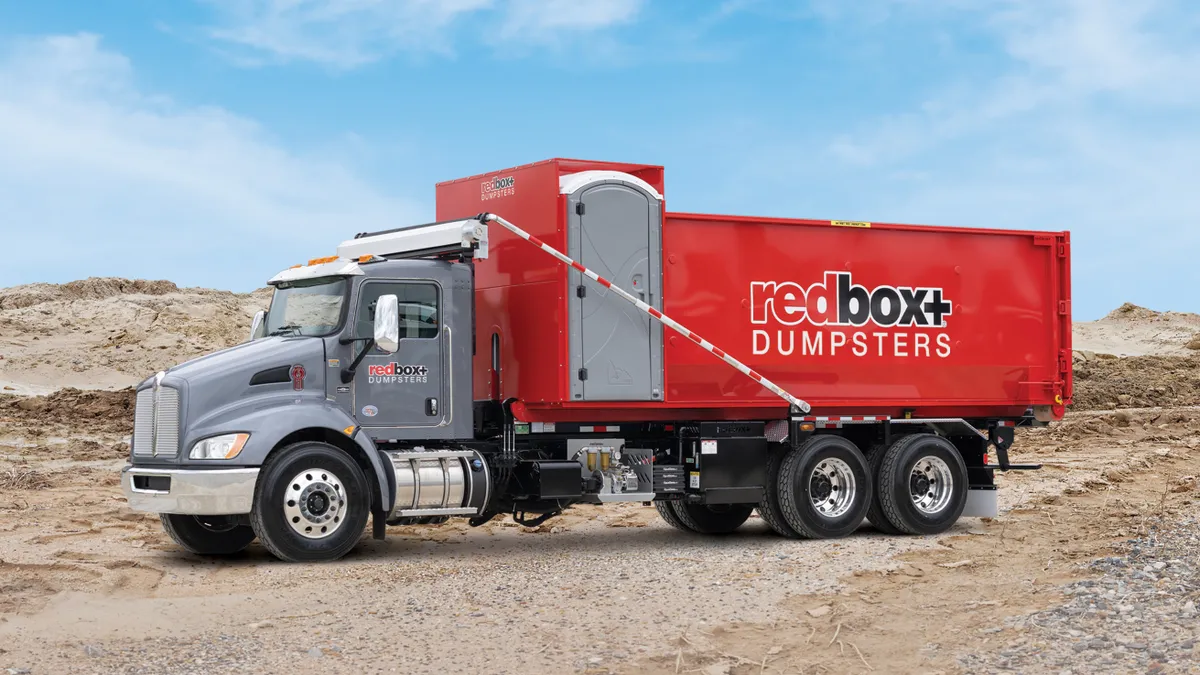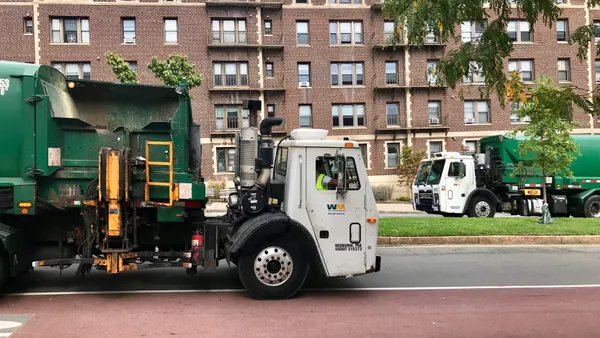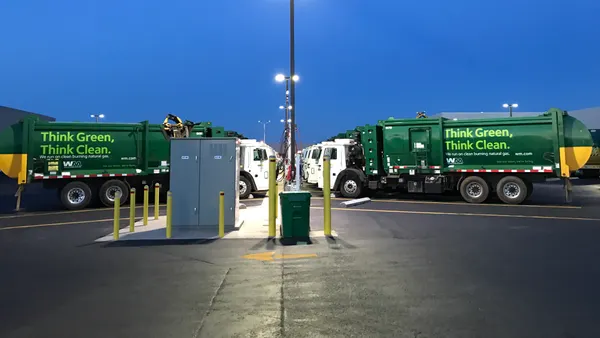While an uncertain economy can suppress demand for certain types of construction projects, it may also lead to opportunities in others. The company behind Redbox+ Dumpsters, known for its distinctive red roll-off containers with portable toilets attached, believes its model is well-suited for the moment.
Belfor Franchise Group acquired Redbox+ Dumpsters in 2021 and the company now has an estimated 90 entities covering 300 territories around the U.S. The franchise group is a division of Belfor Property Restoration, which generates approximately $2 billion in annual revenue across 140 U.S. locations and multiple brands (such as 1-800 WATER DAMAGE) that offer cross-selling opportunities for waste services.
While new construction could be slowing in some areas, Belfor Property Restoration sees plenty of tailwinds as mortgage interest rates rise and home renovation activity remains strong. Waste Dive recently spoke with Doug Smith, senior vice president of franchise development at Belfor Franchse Group, about how Redbox+ Dumpsters has expanded since the acquisition, what’s leading franchisees to enter the roll-off business and more.
The following interview has been edited for clarity and brevity.
WASTE DIVE: What have been some of the biggest changes for Redbox+ franchisees and customers since the deal happened?

SMITH: When it comes to things like marketing and coaching and onboarding and procurement, we've got entire departments dedicated to that. So I think the level of support the franchise received has gone up considerably. We've added four in-the-field business coaches that are dedicated — just traveling around meeting with our franchisees, reviewing their business plans, looking for growth opportunities — which we didn't necessarily have before. We started a franchise advisory council — they did not have one prior to that — who represent the the regions around the country and speak on behalf of the franchisees.
What have franchisees been saying about how this helps them differentiate from competitors and get new cross-selling opportunities?
What we're starting to see a pickup in is the synergies between Redbox+ Dumpsters, Belfor Property Restoration corporate, as well as several of the brands within our franchise family. They use millions and millions of dollars worth of dumpsters on an annual basis. Up until the point where we purchased Redbox+, for the most part that dumpster business was going outside of Belfor to any number of vendors. So not to say that all that is immediately turned over to Redbox+, those franchisees still have to earn the business. What we can do is we can get them in with all those offices, get introductions to general managers around the country, and then as long as they have the dumpsters and the service that we require as Belfor, then they get an opportunity to secure their business.
It’s been a tough environment for waste operators of all sizes lately with labor, inflation and equipment limitations. What are you hearing from franchisees on that front heading into 2023?
Regarding equipment, I will tell you dumpsters are not an issue for us. We've got local and U.S.-based providers of our dumpsters and they're actually building up pretty good stock right now for us. Trucks have been a little bit of an issue, obviously with chip shortages and and some of the supply chain issues that most people are experiencing. However, we order a lot of volume.
So we've got about 12 of our large truck trucks on order. We had six come in recently. All six [trucks] we shot out, to one new franchisee and the rest to the existing franchisees. Between January and May we'll have another six trucks coming in. Those will be allotted out to both existing franchisees looking to expand, as well as some of the new franchises we have in the pipeline. So not saying it's easy, but our size and scale and the amount we order does help when it comes to trying to get in the front of the line.
Waste volumes have also been hard to predict during the last couple years, though your business has seen home renovation activity increase quite a bit. What are you seeing in that area in terms of residential demand?
Our systemwide sales, through September of this year, were up about 43% year over year. Now that means the entire system has grown, so it's not all organic. But our same-unit sales, apples to apples, are up a little over 10.1% year over year.
So we're still seeing an increase, and that can be attributed largely to renovations and some of those particular spots. I think everybody who follows the news sees that both commercial and residential construction is starting to slow a little bit. Obviously, rumors of impending recession, interest rates going up, we see some of that construction going down. But that's not necessarily our sweet spot at Redbox+ anyway. Most of our franchisees focus on shorter-term rentals. Some of those are what I call recession resistant. Roofing, for example, that's a large vertical for us. If your roof is shot it's shot, recession or not. So we get in with roofers, siders, window replacement, landscaping, as well as remodeling and renovations.
You see people choosing not to move, mortgage rates are up. Maybe it's boomers looking to downsize, but they don't want to downsize into a 7% rate. So they're going to work on their house, redo the kitchen so it's more pleasant for them to stay in, but it also gets it ready to sell when the environment changes a little bit.
I think there's been a huge swing of flipping over the last couple of years, investment properties. The first thing they do, if you watch any HGTV show, is put a dumpster outside the house and start gutting it. And then you have other things that you don't even think about like hoarding, that's a space we play in.
New construction is a smaller part of your business, but what have the trends looked like in that area?
It has probably gone down a handful of percentage points, single-digit percentage points, over the last few months. But again, looking at our volumes and just talking to our franchisees, they really are focusing on the other categories I mentioned. I think they'd like to focus in that area anyway, especially once they're up and running.
When you have a new franchisee come out, like any business you're really kind of eager just to take about any business to get your name out there, get started and get some cash flow going. But as you develop a business and you grow and you become known in the space, you can pick and choose your clients a little bit more. Typically, short-term rentals — one week, two weeks, three weeks — are more profitable than six-month or eight-month or year-long rentals.
What else should we expect to see from Redbox+ in terms of growth strategy going forward?
One of the things, in addition to our patented combo [portable toilet] units, that we're really focused on is customer service.
It's a space that isn't necessarily renowned for its overwhelming customer service. That's not to knock anybody, it's just to say that companies are busy or maybe that's not their primary business. For some of the larger companies that have waste management sites and curbside [collection], commercial dumpster rentals aren't necessarily the only thing they do.
We pretty much look to have your dumpsters picked up and delivered within 24 hours of you calling us. So we really do try to focus on customer service, whether it's just timeliness of the pickup and dropoff, or it's putting our powder-coated skids under the wheels on your driveway so there's no scratches and damage. Once we get a customer, we tend to hang on to them.
Should we expect Belfor to do other waste acquisitions in the future, or was this more of a one-off?
I think it's, right now anyway, probably a one-off. We have such a demand within our own company for the use of dumpster rentals that when it came across our desk it just made sense. It was a natural synergy with both the parent company as well as a lot of our other brands within the franchising group. So we already had an insight to "wow, we spend a lot on dumpsters, here's a dumpster company [and] we already know what it can do just within our company.”
We are continuing to not only add franchisees, but most of our franchisees are growing this year as well. Adding dozens and dozens of dumpsters in each location, adding trucks as I mentioned earlier. So as their reputation builds they're growing both in geography, buying additional territories, as well as increasing both their truck and dumpster counts. We had some pretty decent growth this year. I would expect that to continue over the next two or three years.
We’ve heard that fewer people may be entering the waste industry now as entrepreneurs, though roll-off collection can sometimes be easier to enter. What do you see motivating franchisees to enter the business now?
If you're going to get in the waste industry, obviously breaking into curbside and things like that, you've got the 800-pound gorillas out there today that are largely in that space already. And you've seen a lot of consolidation in that space over the years.
But I think it’s a shorter putt to try to break into [this space]. It's expensive, it's equipment heavy, but not like buying a fleet of garbage trucks and servicing a county or a state. So while it's still a little capital intensive, I think it's more economical. You can get a [Small Business Administration] loan for the majority of the equipment purchases.
The other piece of that business is it's not labor intensive. Everybody knows what's going on in the labor markets right now. You need a driver or two, that's really it, to get started. So that's a big positive they mentioned if they were looking at concepts in the service business, like restaurants and other things, retail locations where you've got to manage much a larger staff and deal with all the problems of the job out there regarding labor today.
And then the repeat business. It's recurring business. You get in with these roofers and siders and landscapers. They're killing it right now. Then the pricing [is another factor]. We've got the combo unit, so we can do it a little bit more efficiently than people reserving the dumpsters and the port-a-potty separately.
What we also saw in COVID is people really liking that unit because of the safety and health concerns. People weren't wanting contractors to go in and out of their house all day. And I think a lot of people still feel that way. So I think that's been an attractive part of the model as well.















